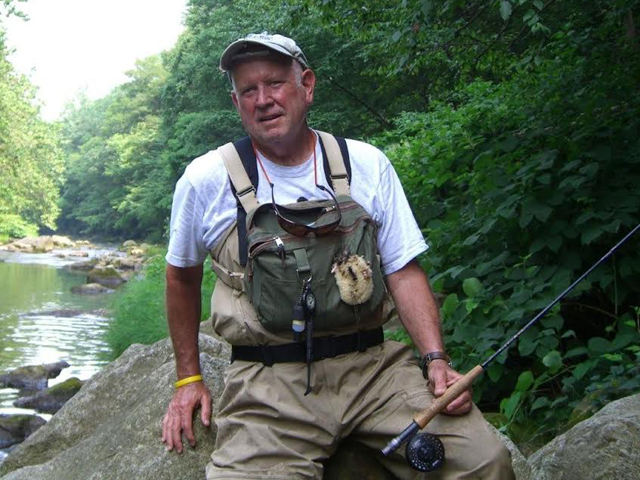
Former Navy captain and current president and founder of Project Healing Waters Fly Fishing, Ed Nicholson. (Courtesy PHWFF)
Ed Nicholson is a retired U.S. Navy captain, based in Port Tobacco, Maryland – 34 miles from the U.S. Capitol. The patriotic veteran spent three decades of his life serving his country. Not only did he survive the Vietnam War, but prostate cancer as well.
After meeting many wounded soldiers while fighting cancer at Walter Reed Army Medical Center, the born survivor decided to dedicate his time to helping other veterans recover from their physical and emotional wounds.
Nicholson, now 72, is the president and founder of Project Healing Waters Fly Fishing (PHWFF), a non-profit organization dedicated to the rehabilitation of disabled veterans through fly fishing.
[youtube http://www.youtube.com/watch?v=dQsIkGJ3__U]
“There’s something very special about fly fishing that’s multi-faceted,” says the former sea captain. “It doesn’t require a lot of physical strength, but dexterity and learning how to cast flies in a beautiful environment. You can’t beat it – the therapy part of it.”
Nicholson says he first fell in love with fly fishing, himself, when the Navy sent him to Idaho for training in the 1980’s. After retiring from the Navy, something told him it would make good therapy for veterans who are trying to get their life back together in the civilian world.
“The whole business of fly fishing is you have to concentrate on what you’re doing,” says Nicholson. “It’s nice to be with friends…your troubles seem to melt away.”
His prediction was right.
Since the founding of the organization in 2005, PHWFF has grown nationwide to serve veterans in 160 locations in 49 states. The program can be found in Department of Defense hospitals, Warrior Transition Units, and Veterans Affairs Medical Centers and clinics and has served more than 8,000 veterans across the country. Last year, Nicholson won a $25,000 Purpose Prize which he donated entirely to PHWFF.
[youtube http://www.youtube.com/watch?v=eoSpPFnKhOc]
Nicholson says there are many success stories of fly fishing changing the life of wounded veterans, but the one closest to his heart is that of his friend Robert. Robert was severely injured in an explosion in Iraq – his face was shattered, and he lost an eye and jaw.
“When I met him, he was in pretty bad shape,” says Nicholson. “He suffered from post traumatic stress disorder, traumatic brain injury, and other physical problems with his arms and body. As Robert said, ‘It was the calming effect of the water and the closeness to his Maker’ – all of that put together – which helped him tremendously, according to the conversations I’ve had with him on many occasions.”
For Nicholson, the biggest struggle that men and women veterans face is re-entering society and leaving the camaraderie and friendships that are big in the military family.
“It’s hard to enter life without that,” says the fly fishing veteran. “That reintegration is difficult especially if they have been disabled, or are undergoing PTSD.”
According to a report by the U.S. Department of Veterans Affairs, an estimated 22 veterans committed suicide every day in 2010.
Nicholson says he hopes more employers become more understanding of some of the issues veterans face.
“They bring a lot of skills that are very advantageous to businesses, but they need to be reached out to and welcomed home,” says Nicholson. “Project Healing Waters can help their healing, but basically veterans need a job and a sense of accomplishment that we all have in our work life.”
Since PHWFF is volunteer-run and dependent on charitable donations, Nicholson now spends his days fundraising and working with the trustees on strategic programming. A large fundraiser, the 8th Annual 2-Fly Tournament, is being planned for April 26 and 27.
“It amazes me how the work fills the day, but it keeps me busy and out of trouble,” says Nicholson happily. “Make sure you’re doing something that when you go to bed at night you feel like a productive member of society – doing something that counts. Think about how you can give back and volunteer.”